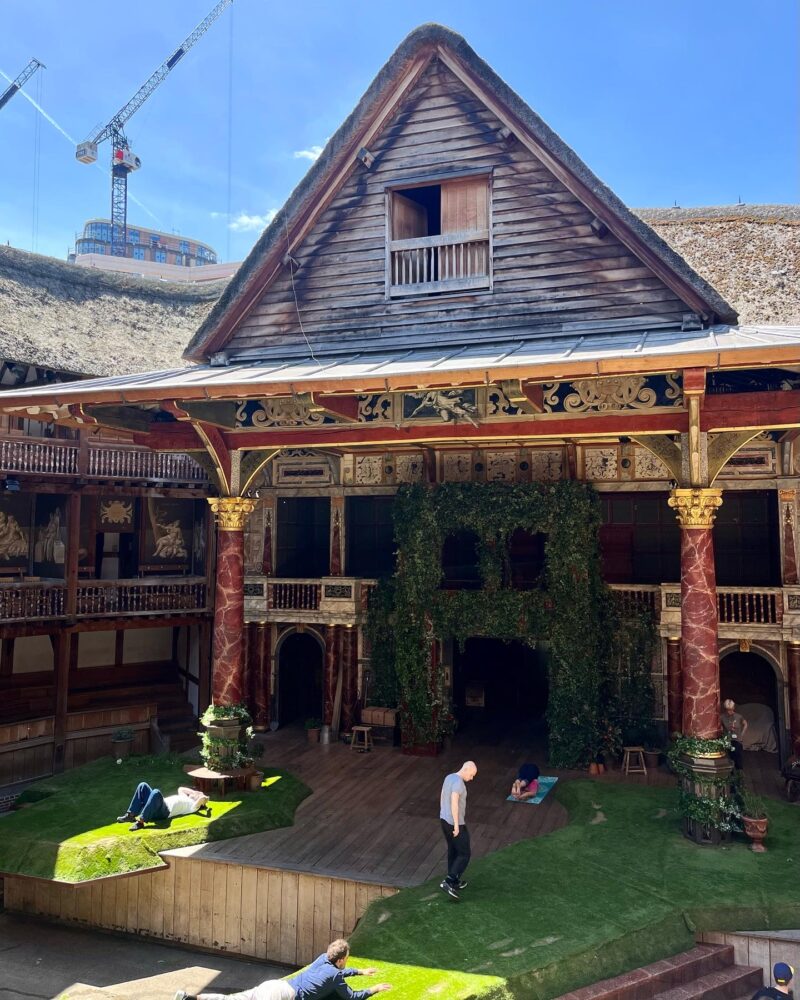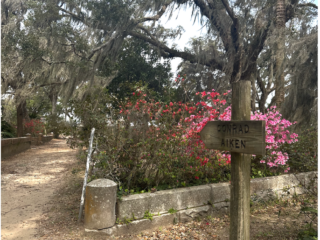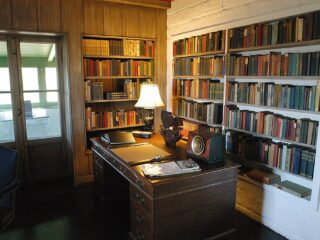by Ashley Conway
But thy eternal summer shall not fade, / Nor lose possession of that fair thou ow’st
– William Shakespeare
Pulling into Stratford-Upon-Avon is a surreal feeling.
I’ve written the name of this town on countless tests and quizzes, a forever multiple-choice question on high school English finals. If there was one thing my primary education ingrained in my mind, it’s this—William Shakespeare was born here.
William Shakespeare was born here.
I wrestle with this thought as I step off the bus. The Bard. The uber-famous playwright. William Shakespeare. Born in the town in which I stand. Just a little riverside county in Warwickshire, central England, home to such an important part of history.
I’m here, but he still seems so far removed from my life, even after years of studying his work. Play after play, sonnet upon sonnet, I’ve excelled in the study of his craft. I know the words, the forms, the technique.
But it’s not the same in a classroom in America. A whirlwind semester of college took me on a journey through his plays, sitting up in my apartment every night, unraveling the mystery of Shakespearean language. I led the classroom discussions, bringing up points my professor never noticed and interpreting moments through my own perspective.
With my AirPods playing white noise in my living room, my roommates would notice me laughing at different scenes. “Listen to this line,” I’d say, reciting the subject of my entertainment with a growing smile, just to be met with blank, puzzled stares.
“It makes sense the more you read it,” I’d follow up. Nods would ensue, and we’d return to our respective work.
Shakespeare can be a tough sell. But I’m a buyer.
And now, a participant—thanks to a two-week British literature study abroad trip having several Shakespearean sites on the itinerary.
Walking up to Anne Hathaway’s Cottage, I feel like I’m walking back in time. The home of Shakespeare’s wife seems out of place in the rest of the city with its tan exterior, wooden supports, and thatched roof. Yet somehow, it’s more genuine.
I stroll through the garden. The excess of flora crispens the air. It’s fresh. The flowers grow into the narrow paths, so I turn sideways and shimmy through certain parts. It could easily be claustrophobic, suffocating even. But I barely notice the soft scratches on my skin as I continue through.
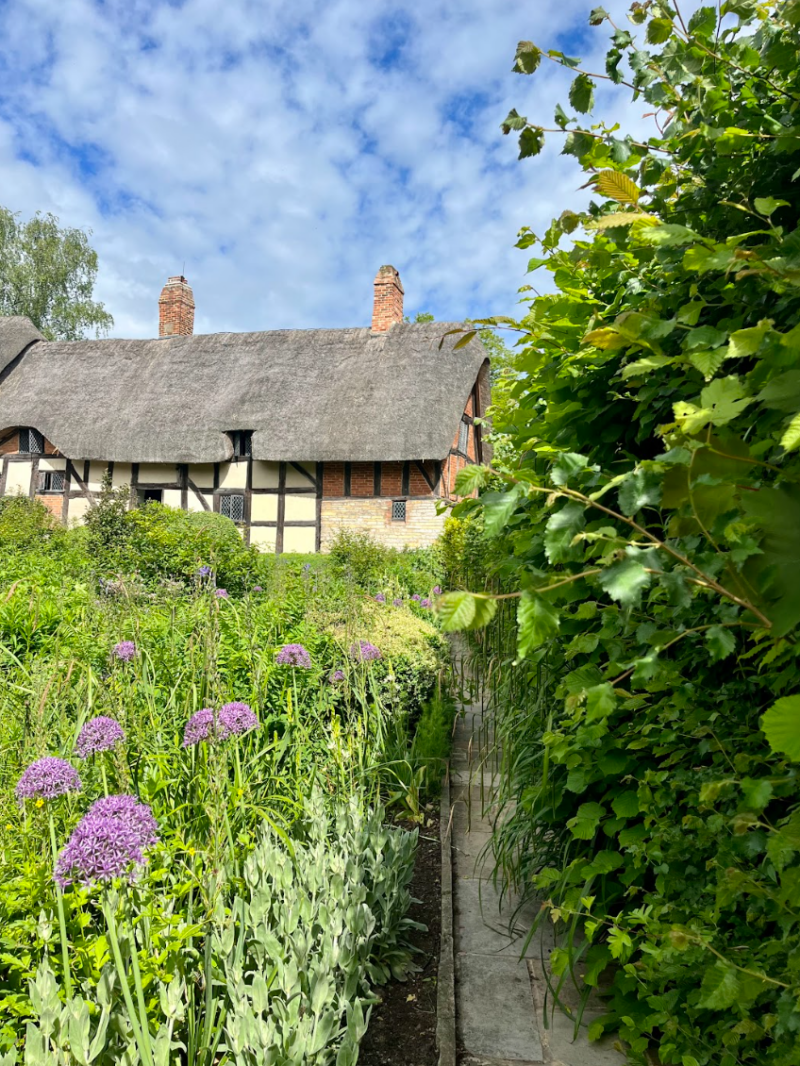
I walk up the stairs to the entrance, and the temperature change hits me as I cross the threshold. The hot spring air stays outside, as does the rest of the 21st century. Here, I enter the era of the bard.
The upstairs didn’t exist in Shakespeare’s time, and how fortunate for him—these stairs are deadly. I creep my way up, bracing myself firmly against the walls. Stepping over raised door jambsdoorjambs, I make my way into the bedroom, and it greets me. The courting chair.
In this chair, Shakespeare wooed and won the heart of Anne Hathaway. I let my mind drift for a bit, daydreaming of being courted by a man who wrote such epic love stories. Was he a witty Touchstone? A genuine Ferdinand? Or was he a resistant Benedick, becoming more dedicated over time? Thankfully he wasn’t as impetuous as Romeo, or we would’ve never even known the story.
I head back downstairs. A guide greets us in the kitchen, revealing the intricacies of 16th century cooking and food storage. I look around the room as she speaks, studying the witch’s mark over my shoulder.
“These floors and the exit towards the garden are actually those that Shakespeare and Anne walked on in their time,” I overhear the guide explain. My eyes snap down to my feet.
Incredible, I think. I follow imaginary footsteps all the way outside.
Heading towards the distant section of the garden, I notice a gate leading to another area. I head in, friends in tow.
The further we venture in, the more sculptures reveal themselves. The first I notice is a large piece of metal, a circle protruding out.
“Do you see a name?” I ask.
“Around the other side,” my friend says.
I circle the piece and laugh when I see the title. “It’s Falstaff,” I explain. “Well, his belly, at least.”
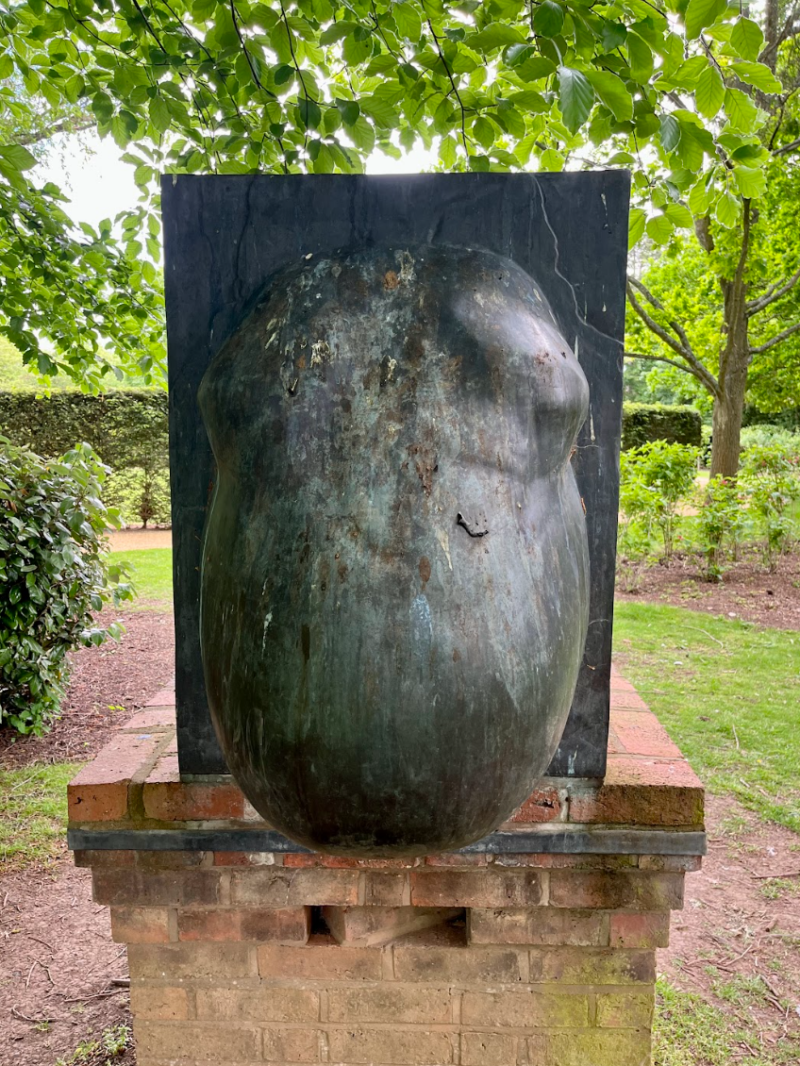
I chuckle at the confused looks and beckon them closer. I like talking in general, but even more so when it’s something about which I’m passionate. I lead them through the garden, explaining backstories and significance behind Ophelia, Titania, and King Lear. My dad has always complimented me on my prowess as a speaker, and I feel it here. I love sharing my knowledge with my friends, especially ones who care.
The sculptures are beautiful, sometimes even jarring. It fits. Shakespeare isn’t always peaceful and rosy—his work was meant to provoke questioning, foster thought that transcends the time of its conception.
And it does. Across town in Shakespeare’s Birthplace Museum, I peruse the displays of works that have been inspired by his originals. Retellings, interpretations, and satire of his ideas flood mainstream media, even when we don’t notice it. It’s amazing, seeing how far-reaching his influence remains.
Before entering the Birthplace, I catch a glimpse of the prologue to “Romeo and Juliet” displayed in the garden.
“Hold on,” I say, turning around, “I want to test myself.” I travel back to ninth grade, picturing my teacher’s guiding hand gestures through every line of the sonnet. “Two households, both alike in dignity,” I speak, twos held up in both hands, “in fair Verona, where we lay our scene.”
I make it through twelve lines before I peer over my shoulder for a hint. “Ah, hold on. I got it,” I urge. Touching my ears, I finish reciting, “The which, if you with patient ears attend, What here shall miss, our toil shall strive to mend.”
My friend smiles at me. “Nice work,” he says.
A soft grin covers my face. “Kind of upset I couldn’t make it all the way through,” I admit. “I used to know it by heart in freshman year.”
“Yeah, which was seven years ago,” he laughs. “I wouldn’t even be able to say a single line. I’m impressed.”
I am too. I’ve always had a knack for memorization, but it really has been so long. For a moment, I stop and think about just how much of my schooling has centered on Shakespeare. Every year of high school, we had a section dedicated to one of his plays. Some of the specifics are hazy now, since I’ve read so many since then, but the love remains. We used to act out scenes in the middle of class, shouting “Montague!” and “Capulet!” across the room or clutching my classmate in my arms as she dies in battle. Then I continued with it in college, writing detailed explications of his sonnets and 2000-word literary analyses of his plays. And even though it was a lot of work, I never once dreaded it.
Entering the actual Birthplace sends me back in time, just as the cottage did. Awed at the intricate wallpapers and tales of the pilgrimages, I barely notice my feet taking me towards the most important room in the building.
In the room in which Shakespeare was born, the energy shifts. This is the room where it happened, legitimately. I wonder if this town knew that years down the road, people would pay money to stand in my spot right now, admiring a room used to give birth.
But it wasn’t just some child who came into the world here nearly 500 years ago. With Shakespeare’s birth, a wealth of potential, new ideas, and longstanding influence came forth. God, what it must have been like to be in their position, hearing that a child from this small town was making waves in London, his plays bringing monarchs into the audience.
The fireplace is blocked off by protective glass. He would’ve been born right next to it, inches from where I stand. He slept here, grew up here, formed his mind here. And how fortunate I am to reap the benefits of that development.
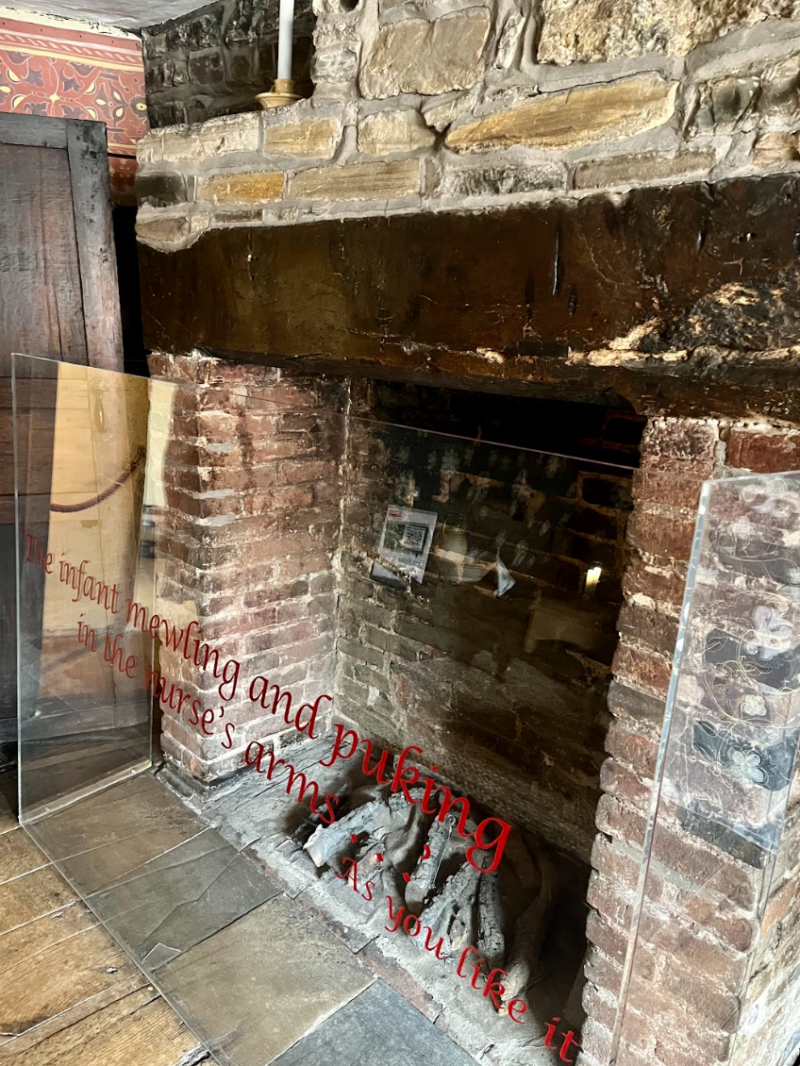
I count my blessings the rest of the week. A stint in Bath pushes Shakespeare to the back of my mind to make room for Jane Austen for a bit, but on the bus ride over to London, the excitement swells once more. And a few days later, as we approach the Globe Theatre back in London, it fills my body.
I could see it from down the street, the thatched roof standing just as tall as the modern buildings around it. These Shakespearean buildings have a way of making themselves noticed in an intriguing and heartwarming way.
Our tour guide meets us inside and leads us closer toward the theatre. Walking around the outside, I think about how many productions from this theatre I’ve watched online. Throughout the Shakespeare author study I took in college, I realized the Globe’s performances were my best study tools—they stay largely true to the script and the actors’ tone and body language helps convey the themes, even before I could figure out the context. I think I’ve seen their 2016 production of “The Merchant of Venice” at least ten times while writing a term paper on how they dealt with the blatant anti-Semitism in the text. (Though I love Shakespeare’s work, I can still recognize flawed thinking.)
So, when our guide opens the doors and leads us inside, my breath hitches in my throat. So many hours spent in my living room, laptop hooked up to the television so I could watch these productions, and now I’m standing where they all occurred.
I cannot believe I’m here.
Shock resounds in my body as I make my way to the side. The scent of oak fills my head as I reach out and touch the beams holding it all together.
I cannot believe I’m here.
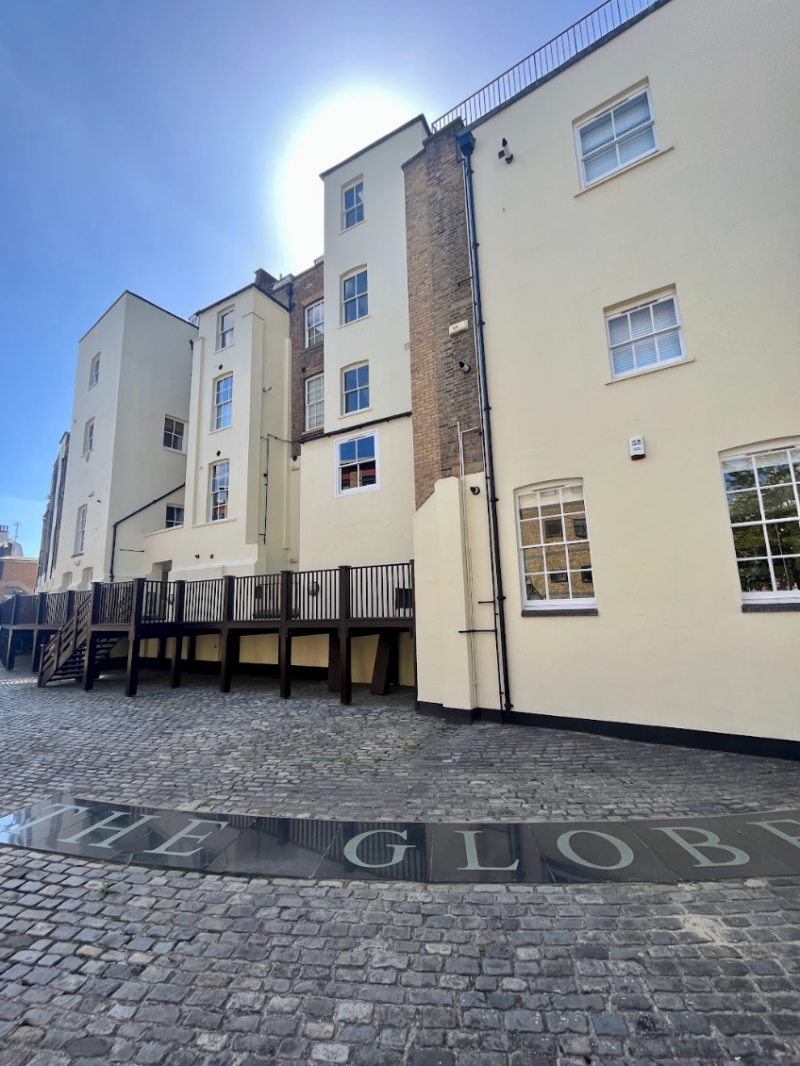
Taking a seat, I study the stage as the guide explains its intricacies. The videos don’t do it justice. The attention to detail on every single viewable inch is superb, carefully thought out, amazing.
“If you see the trapdoor at the bottom, that is where demonic figures come up from. Anyone know one?” our guide asks.
I raise my hand. “The Ghost in ‘Hamlet,’” I provide.
“Yes,” she smiles. “And angelic figures can descend from the top,” she says, looking at me again.
“Ariel in ‘The Tempest,’” I say.
She smiles at me again. Recognition is sweet. But being here trumps that feeling.
We break from the tour, and my anticipation builds for the performance tonight. It intensifies throughout the day, distracting me from my free time around London. Lunch evades me, and I absentmindedly eat chocolate gelato walking along the streets.
As my friends and I make meaningless chit chat to fill the time, a sign catches my eye in my peripheral. “Hold on,” I prompt.
Right there on my left, on some random side street in London, sits the site of the original Globe Theatre.
“Well, would ya look at that,” my friend says.
We didn’t intend to come here. In fact, we had no idea where the original site was. But here we are, happening upon it by accident.
I walk up and touch the sign.
No, this wasn’t an accident. I was meant to walk here. I’m not sure what led me in this direction, but I close my eyes and thank it.
The time flies until showtime. Showing my ticket, I scan in and grab a few snacks. The show can’t start soon enough. It’s much more crowded at night—masses of people swarm around the outside, and I have to push to get to the stairs to my seat. This must’ve been how Shakespeare’s patrons felt, surrounded by hubbub as they entered the theatre. Well for them, the craziness never really stopped—modern audiences are a bit more reserved, attentive, and sober.
I set my cushion down on my seat and watch the groundlings flood in. It’s amazing, really, how many people can fit in here. Every time I think it’s full, another wave of people enters. By the time the show begins, there’s barely room to move down there. But somehow, they do, because the actors have no qualms about getting involved with them. The way the people ebb and flow astonishes me. No one down there has reservations about participation or engagement. It’s beautiful.
The Globe sets “Much Ado About Nothing” in post-WWII England. One of my favorite aspects of Shakespeare’s plays is how the time and place can be changed, but the meaning remains. And this directorial choice pays off.
The show leaves me speechless. I’d given my friends a rundown of the plot a few days prior in hopes of maximizing their experience, but the anxiety that they wouldn’t enjoy themselves had lingered with me all week. But as I look over at them, smiles paint their faces, and I can tell they get it. Their laughter and excitement are just as amazing as the show.
As the accordion music fades and the show closes, I clap so hard my hands turn beet red. Screams and hollers fill the tiny theatre, and I’m so happy to be in this place.
We walk towards the underground station, and my friend looks at me and says, “You know, I enjoyed that way more than I thought I did. I think it may have been one of the best parts of this trip.”
He’s certainly come a long way from leaving the room while I watched the plays in our apartment. It’s a great sight to see.
Even as I head back to America, the experience sticks with me. I tell my mom that it is by far the best thing I did abroad, and given the opportunity, I’d see twenty more productions there. I don’t think I could ever get enough.
I even drag her along with me to the New Orleans Shakespeare Festival on my birthday trip. In the tiny Lupin Theatre in Tulane University, I immerse myself in Forest of Arden. This performance of “As You Like It” lacks the scale of the Globe Theatre, but I don’t even care. The audience interaction and emotion ring true.
My family don’t enjoy it quite as much as I did, and outside they admit to being a bit confused.
“I get it,” I say. “I guess it’s just different for me because I’ve been invested in it for so long.”
My dad smiles at me. “I don’t even care that I didn’t understand all of it,” he says. “Seeing the smile on your face the entire time was the best part.”

